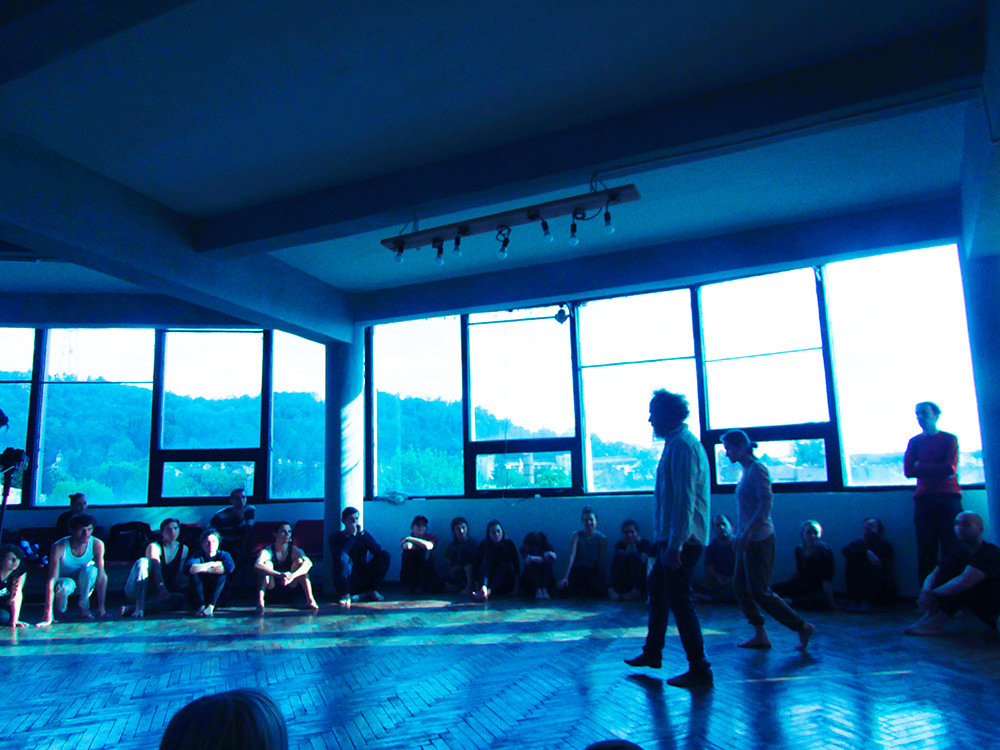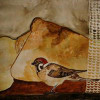World is in a mess
About the theatrical and performative project `Gershom`
`And she gave birth to a son, to whom he gave the name Gershom: for he said, I have been living in a strange land.` (Exodus 2:22)

Recently I felt such apathy towards performers and so disappointed by theatergoers that I thought I would never visit the new theater project workshops in Gershom had I not recognized the great name. Luckily and just in time I discovered the meaning of that word. The truth is that in a real life I’m quite interested in Zenon Kosidowski, especially his very popular book `Bible legends` an intersection of bible criticism, archeology and healthy irony. An interesting fact by the way — that book was published of Politvydav Ukraina in 1978 and it was intended as a kind of an atheistic educational literature but in practice it became the first source of bible stories for our grandparents. What an irony! In religious fanaticism we trust! They just ignored critical postscripts in the book, that were inserted after every bible story. Reading Kosidowski my attention was drawn to Exodus and I found a name, Gershom, the same name as the theater project in Lviv.
Gershom, in Hebrew means foreigner. Moses named his first son Gershom, because he was foreigner at that time — after he killed the Egyptian overseer he ran away and stayed in a country called Midian. So when I discovered that I decided I should go! So I took my daughter and went to this full-of-contradictions district of Lviv — Pidzamche.
The theatre and performative project “Gershom” now operates on the premises of Factory “Rem” (Zavodskaya, 31) on the fifth floor. The founder of the project is the American director with Ukrainian origin Seth Baumrin.

To come to the special workshop you must fill the registration form where you choose your role in the event : actor, dancer, artist, musician, singer, guest or photographer. This act of choosing already gives us an understanding of the idea — interdisciplinarity as a main vector of activity and everybody is welcome.
So everything started from a game. An easy game called cat and mouse. The Cat is chasing the mouse, and the mouse is trying to escape the swat of the cat’s claws. Seth is reminding participants to keep maximum silence, because any sound could give away an escaping mouse and attacking cat as well.
The game is repeating like a loop with a new actors each time. And the effort to keep silent is becoming better and better. Seth puts the attention of participants on how the nature of existence is changing when they are converted from cat to mouse and vice versa.

And there is something more than instruction in his words. It’s a kind of a very consistent presentation of some philosophy. From the example of the relationship between mouse and cat we can discover this very old ritual of the delicate victim’s plasticity and lightening fast reaction of the attacker. The director is explaining the mechanics of a step, he is showing by his own example and asking other shy people to join.

The first part of workshop is an opportunity to research the space and organize yourself in it. But it was related to more than the body — not merely an opportunity to take a step or make some other movement, to find a place for the foot or to made eye contact with a partner. This was research into opportunity in general. Seth asked people — have you tried something new? Have you implemented all movements that you wanted to do? Have you discovered some new opportunity in your body? And I was sitting, asking myself how often I’m looking for opportunities in my daily life? And how could my life been change if I start to look for opportunities daily?

It was interesting that anybody could join the workshop, not only artistic people but ordinary ones. I asked Seth about importance of balance in numbers of professional people and beginners. After the workshop I just asked Seth a few questions because I was curious about his motivation and goals.
`It`s important. And many people are asking: Why don’t you work only with professionals? You will have a different results! It`s true. When I`m working with professionals I get a different result. But the Theatre should open it`s doors. I know that theater healed me when I was in trouble. And we did not talk about it — we just did it.` — Seth Baumrin
I have no doubt about the healing quality of a performing activity because you are trying to organize your body in space or while trying to connect with a partner on a stage, you are observing the mechanics of your body. And to understand your body is a way to heal it. And it goes beyond the body because you are discovering and identifying yourself; this is about a self-acceptance. It`s about harmonization and finding the order in any special circumstance.

Project Gershom — it`s not just a territory for actors, this is a possibility for anyone to find new qualities of their bodies and minds as well. It`s very important that in the Gershom project there are a lot of professionals that could give you some recommendations or help.
`Everybody is welcome. I think it’s really important for people who feel that they are not getting the opportunity to do what they want to do. What they dream of. And especially performers at the time when they are most creative, physically their feet and their minds still work. (laughs) It is really important for them to come to these workshops. Performer education is extremely important — it is a part of survival.` — Seth Baumrin
I`m really impressed by this workshop and Seth`s professionalism, his ability to direct the performers, his ability to lead and teach them. This work is not only mechanical exercises or training, it is a philosophy of movement, the detailization of nature, movement and action, motives and goal, starting and finishing, the result. And also I’m impressed by openness in the workshop — It does not matter how old are you, who are you, what is your profession, skin colour, what interests you, or what faith you have. In Gershom you can get something new and become someone else. But from my point of view the first task is — to accept yourself.

After a short break Seth gives instructions for future acting — he divides all for five groups. Each group have their own rules and some proposed conditions. After the short instructions Seth encourages to start the performance that everybody was preparing for. But performers are raising their hands and asking some more questions — `Could we do this? Could we do that?` The numbers of questions increases and suddenly director say: the more questions the more limits on your liberty. I give you simple instructions and three rules — do not harm yourself, do not harm someone else, and do not fall down but if you fall, do it good. And by asking too many questions you make your freedom smaller and smaller. So just act!

Me: Who is this Gershom? Who is this foreigner? Is it you or it is everybody who comes here?
Seth: Yes, i have a personal relationship with it but I think than the answer is… (deep breath) The world is in a mess! And We are all strangers even in our country. So I look to the young people — my students in New York, my students here — They are going to inherit the world with environmental problems, with a crazy economy. So that word — even if it comes from a bible story, I think it really speaks to experiencing 21st century. I`m a father and I want to be perfect to my children but I would not want to be dishonest to my children about the world that they are going into. When we push somebody to the outside because we don`t understand them it`s very painful. And I know that I am guilty of this too. So this healing going on here and when you ask why do I do theatre I say because it heals people. And when people ask me — why do you go outside of your country to do theatre — I ask why Ghandi went to South Africa? So we practice peace each in our own way.

